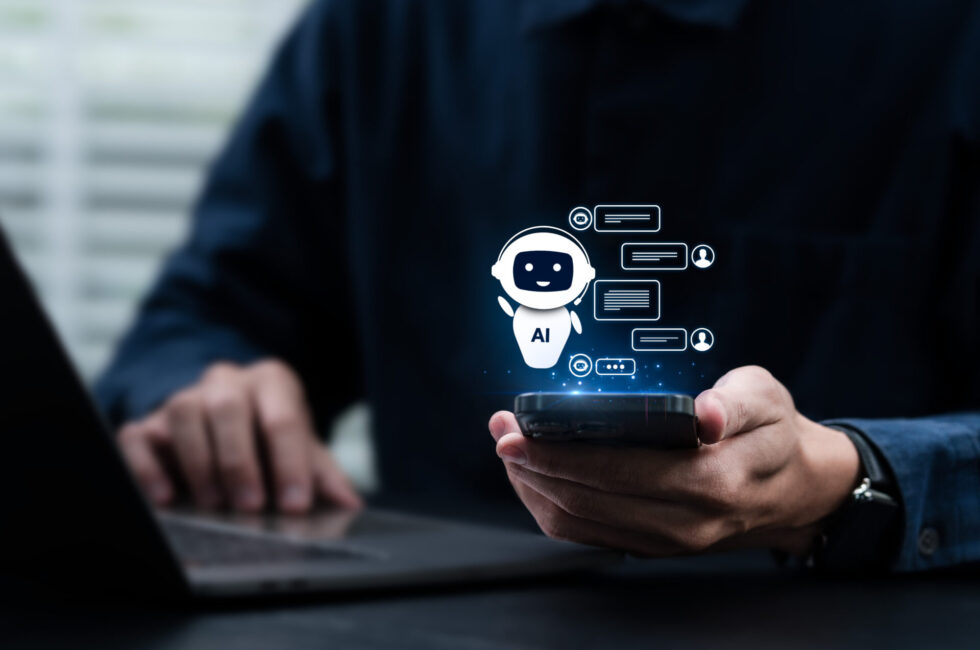What is Agentic AI, and How Can It Change Small Business Operations?
No doubt you’ve already heard the term generative AI. One of the most famous generative AI platforms is ChatGPT, which can create content based on human commands. You may also have heard of agentive AI, which is also capable of creating content with human input but can also offer its own suggestions.
Then there is agentic AI, the new digital player in town.
So, what exactly is agentic AI? How does it work and how can it be used to help your business thrive?

What is agentic AI?
Agentic AI is a new generation of AI that goes beyond the boundaries of traditional AI. Instead of simply responding to commands, agentic AI is designed to act autonomously toward a specific goal. This means that it can make decisions and complete tasks without the need for specific, ongoing instructions.
“The way that agentic AI differs from traditional AI is that it has the potential to take initiative and be proactive,” explains Brad Hoyle, Operational Excellence Manager at BizCover. “Agentic AI represents massive possibilities for small businesses as well as large corporations in the next few years.”
Generative AI versus agentic AI
Generative AI is known for being able to create content like texts, images or computer codes in response to prompts. It’s best at answering questions or producing ideas, but only when prompted. It cannot act on its own without human input.
Agentic AI differs in comparison because it can create content and then use that content for a specific goal.
A generative AI might be able to write a marketing email when you ask it to; but an agentic AI could write the email, schedule it to send to your customers, monitor the results and then tweak future emails based on performance.
Agentive AI versus agentic AI
Agentive AI is capable of offering suggestions and automating minor processes. However, it still requires human input to execute tasks. An example of this would be an email app that recommends replies. It is capable of creating a response to an email, but it is not capable of deciding whether or not to actually hit ‘send’. That’s where human input is needed.
Agentic AI takes this one step further. Sticking with the above answer, agentic AI would be able to create a response and then independently decide what the next step should be – such as sending the reply and then following up later if no further response is received from the original sender.
How agentic AI works
Agentic AI relies on a complex combination of machine learning, natural language processing (NLP) and automation technologies in order to successfully make autonomous decisions and take action.
- Machine learning: A type of AI that learns from data and improves over time without being explicitly programmed for every task.
- NLP: Enables AI to understand, interpret and respond to commands and queries (spoken or written).
- Automation technologies: Tools and systems that allow processes to run without human intervention.
Combining these attributes, agentic AI “is able to function more like an actual member of the team rather than just a tool,” says Hoyle.
Building on these aspects, agentic AI is able to complete the following actions autonomously, acting on its own without needing constant instruction:
- Goal setting: The AI is able to understand a clear objective. For example, this could be “Grow my social media presence.”
- Planning and reasoning: It works out how to achieve that goal. It figures out what steps to take, what resources it needs and in what order tasks should be done in.
- Feedback loops: Once steps have been implemented to achieve the goal, the AI then learns from what happened. This allows it to adjust and improve its actions based on results.

Real-world examples of agentic AI for small businesses
“If you think about the capabilities of agentic AI, you can see that there are plenty of ways it could benefit small businesses,” says Hoyle.
Most small business owners are expected to wear many different hats during the day – running the business as well as marketing, accounting, recruitment and everything else in between. But it’s impossible to be an expert at everything. This is where agentic AI can help.
“Agentic AI has the potential to save business owners precious time and money so they can focus on what they do best.”
Example #1: Social media marketing
Sticking with the prior example, let’s say a business owner wants to use agentic AI to help grow their social media presence and attract more customers.
Generative AI could help to draft social media posts and create image ideas, but this campaign would still need plenty of human input – like scheduling, posting, performance tracking and data analysis. Agentive AI could take it one step further and suggest content ideas, optimal posting times and draft posts, but it would not be able to take action on its own.
On the other hand, agentic AI could theoretically manage the entire process from start to finish. It could:
- Write engaging posts tailored to the target audience.
- Schedule and publish the social media posts.
- Track likes, shares, comments and follower growth.
- Adjust posting frequency, content type or tone depending on what performs best based on analytics.
Example #2: 24/7 Customer service
Providing excellent customer service all day every day can be a challenge, especially for small business owners who don’t have the budget to afford a dedicated customer service team. But agentic AI could be used to maintain consistent, helpful customer service levels around the clock – whether online or over the phone.
Unlike traditional chatbots that offer limited, pre-scripted answers, agentic AI can manage entire customer conversations autonomously. It can understand customer queries, provide personalised responses, and even take next steps like processing returns or sending follow-up messages.
Agentic AI-powered customer service tools could:
- Respond instantly to customer enquiries across multiple channels (like your website, email, and social media).
- Tailor responses based on previous customer interactions and preferences.
- Escalate complex issues to a human when needed, while still handling common tasks like order updates or FAQs.
- Learn over time to improve the quality and tone of its responses.
Other examples of small business agentic AI use cases
Other ways that agentic AI could be used to help small businesses include:
- Inventory restocking alerts
- Identifying which products are performing/underperforming
- Real-time order updates and follow-ups
- Marketing budget allocation
- Tailored content and product recommendations based on individual customer preferences.

Data privacy and agentic AI
One of the main concerns around AI is data privacy and ethics. All forms of AI need data in order to learn and function. Depending on how a business chooses to use AI, this could include sharing customer information, business metrics and online interactions.
This is why proper data management is extremely important for small businesses that choose to use agentic AI tools. Mishandling data can lead to consequences such legal penalties, financial losses and reputational damage.
That’s why it’s important for business owners to understand exactly what kind of data they need, what they don’t, how it’s collected, stored and used.
Before settling on an agentic AI provider, it’s generally a good idea and start by checking their privacy policy and terms and conditions, and ensure that they comply with the Privacy Act (1988) as well as any other applicable local and international laws.
Recent changes to data privacy laws in Australia
Recent changes to Australian privacy laws could impact your small business, especially if you’re using – or planning on using – agentic AI.
While most small businesses with an annual turnover under $3 million are currently exempt, there are exceptions. To see if your business could be impacted, visit the OAIC website.
Stay curious and informed
Agentic AI is an emerging technology. While it has the potential to transform the way small businesses operate – saving time, improving customer service, optimising marketing efforts – there are still some challenges that business owners will need to take into consideration. However, looking forward to the future, it’s clear that there are plenty of benefits for those willing to explore this new and exciting technology.
As Brad Hoyle said at the 2024 BizCover Tech Showcase: “I think 2025 will be the year of agentic AI, where voice and digital agents become commonplace. It’s exciting to think about, because it means that we can provide an even higher level of customer service to our customers, and it’s completely scalable depending on demand.”
And this is only the beginning.
This information is general only and does not take into account your objectives, financial situation or needs. It should not be relied upon as advice. As with any insurance, cover will be subject to the terms, conditions and exclusions contained in the policy wording or Product Disclosure Statement (available on our website). Please consider whether the advice is suitable for you before proceeding with any purchase. Target Market Determination document is also available (as applicable). © 2025 BizCover Pty Limited, all rights reserved. ABN 68 127 707 975; AFSL 501769.


![[Press Release] Power loss biggest threat to Australian businesses as storm and fire season approach](https://www.bizcover.com.au/wp-content/uploads/Power-loss-biggest-threat-to-Australian-businesses-as-storm-and-fire-season-approach-1.png)
